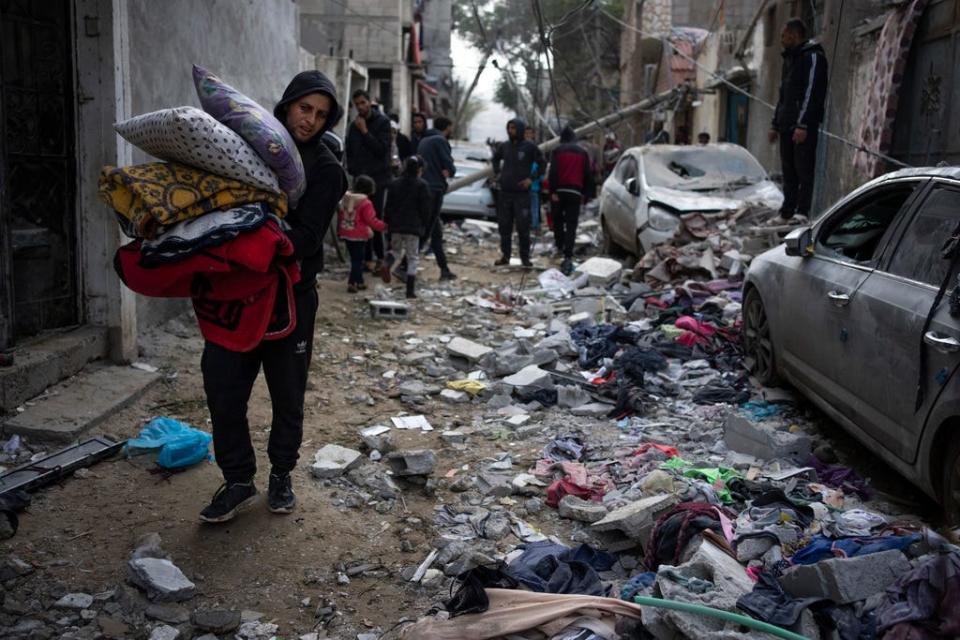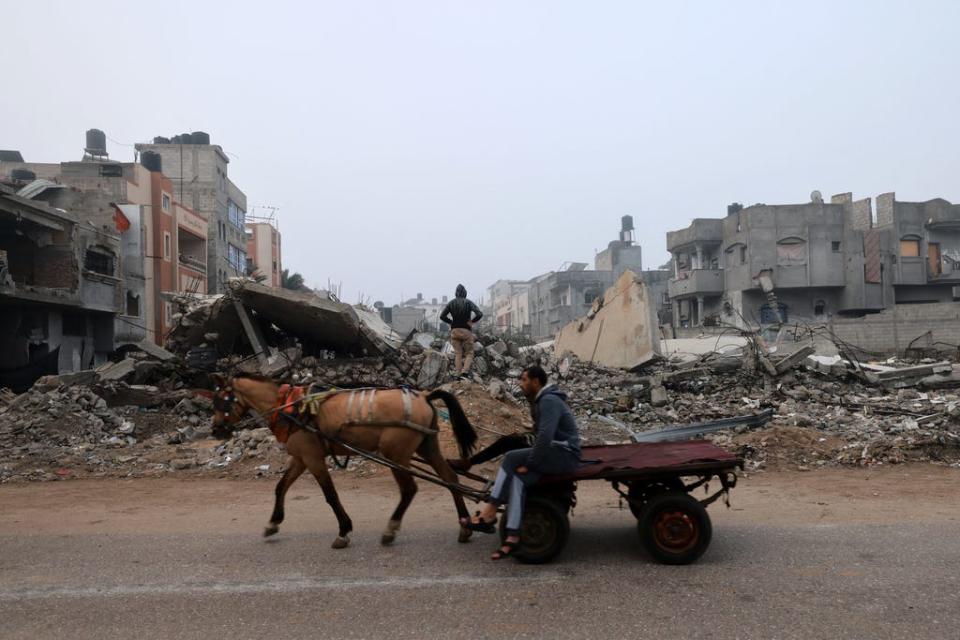Israel prepares to evacuate Rafah before expected invasion despite US objections
- Oops!Something went wrong.Please try again later.
Editor's Note: This page is a summary of news on the Israel-Hamas war for Friday, Feb. 9. For the latest news on the conflict in the Middle East, view our live updates file on the war for Saturday, Feb. 10.
Israeli Prime Minister Benjamin Netanyahu on Friday said he asked security officials to draft plans to evacuate Rafah before expanding military operations there despite the Biden administration and humanitarian aid groups warning that an invasion of the crowded city would be devastating.
Netanyahu's office said the "combined plan" would include mass evacuations and operations to topple four Hamas battalions. The United Nations says 1.4 million people have packed into Rafah, Gaza's southernmost city, which was home to roughly 280,000 people before the war.
"It is impossible to achieve the goal of the war of eliminating Hamas by leaving four Hamas battalions in Rafah," Netanyahu's office said in a statement. "On the contrary, it is clear that intense activity in Rafah requires that civilians evacuate the areas of combat."
This week, Netanyahu rejected a Hamas proposal for a multi-stage truce and hostage release that included a demand that Israel release hundreds of Palestinian prisoners. Netanyahu vowed that Israel will continue fighting for months until it achieves “absolute victory."
More than half of Gaza's 2.3 million people have taken refuge in Rafah to escape the war, but they have not been spared from bombardment. For weeks, Israeli airstrikes have hit areas of Rafah and other parts of southern Gaza, where leaflets and evacuation orders from the Israeli Defense Forces told them to go. The Israeli military says it strikes Hamas targets and it blames the group for civilian casualties.
Those displaced in Rafah are living in makeshift structures, tents or out in the open. The U.N. and other humanitarian organizations have repeatedly warned of dire conditions, rampant spread of diseases, and a shortage of clean water, food and sewage infrastructure.

Developments:
∎ As of Friday, at least 85 journalists and media workers have been killed in the war, according to preliminary investigations by the Committee to Protect Journalists. The nonprofit said the war has been the deadliest period for journalists since it started collecting data in 1992.
∎ Since the start of the war, 27,840 people, mostly women and children, have been killed in Gaza, according to the Health Ministry.
∎ The Israeli military said on Friday that within the last 24 hours, troops have "conducted a joint naval, air, and ground troop operation to eliminate terrorist infrastructure and several terrorists." The military did not identify where all the operations occurred but said that 15 militants were killed near Khan Younis.
∎ The U.S. military on Thursday launched several strikes against four Houthi drones and seven mobile anti-ship cruise missiles that were prepared to launch against ships in the Red Sea, according to U.S. Central Command. It's the latest American attack on Houthis' military assets in recent weeks to stop the rebels from striking commercial shipping and Navy vessels.
Biden calls Israel's military response 'over the top'
The White House on Friday sought to downplay sharp criticism levied against Israel's military operation by President Joe Biden and a senior national security official.
Biden said Israel's military response in Gaza "has been over the top" – his sharpest criticism of Israel's conduct in the war. Hours earlier, U.S. National Security spokesperson John Kirby said that considering the current conditions in the region, the U.S. "would not support" intensive military operations in Rafah.
"I think you all know more than a million Palestinians are sheltering in and around Rafah. That’s where they were told to go. There’s a lot of displaced people there," Kirby said. "I could tell you that – absent any full consideration of protecting civilians at that scale in Gaza – military operations right now would be a disaster for those people, and it’s not something that we would support."
Also on Friday, the New York Times reported it had obtained a recording in which Jon Finer, the president’s deputy principal national security adviser, expressed a lack of confidence in Netanyahu’s right-wing government during a meeting with Arab American and Muslim community leaders this week. The White House National Security Council confirmed that Finer’s comments, as reported by the Times, were accurate.
An administration official told the Associated Press that Finer was speaking specifically about the Netanyahu government’s commitment to pursuing a two-state solution – one in which Israel would co-exist with an independent Palestinian state – once the war ends. Netanyahu throughout his political career has consistently opposed the creation of a Palestinian state.
“The President and Mr. Finer were reflecting on concerns we have had for some time and will continue to have as the Israeli operation proceeds, about the loss of Palestinian lives in this conflict and the need to reduce civilian harm,” National Security Council spokesperson Adrienne Watson said in a statement. “The President has made clear since the first days of this conflict that we share the aim of defeating Hamas, but that Israel must reduce, as much as possible, the impact of its operation on innocent civilians.”
Assessment of Rafah shelters describes dire conditions
Since civilians began to stream into Rafah by the thousands, humanitarian organizations, including multiple U.N. agencies, have warned of abysmal conditions facing those sheltering in the border city.
The Norwegian Refugee Council on Thursday released an assessment of nine shelters in Rafah showing that people had no drinking water, showers or personal hygiene items.
The report said shelters operated at 150% capacity and that diseases, including hepatitis A, diarrhea, smallpox and lice, "were reported in every location."
Angelita Caredda, the Norwegian Refugee Council’s Middle East and North Africa regional director, warned the situation in Rafah is "already dire, and a full-scale Israeli military operation will lead to even more loss of civilian life."
“An expansion of hostilities could turn Rafah into a zone of bloodshed and destruction that people won’t be able to escape," Caredda said. "There is nowhere left for people to flee to."
Israeli troops storm hospital in Khan Younis, Palestinian aid group says
The Palestinian Red Crescent Society, an independent humanitarian aid group, said Friday on X that Israeli troops raided Al-Amal Hospital in Khan Younis and that it had lost contact with its teams at the facility.
Thousands of displaced people and patients were evacuated from the hospital and the group's headquarters in the southern Gaza city earlier this week. Israel has focused its ground operations in Khan Younis but in recent days officials have announced an imminent shift to Rafah.
Hospitals have had to manage an overwhelming number of patients amid a shortage of health care supplies and medicines as aid continues to only trickle into the enclave. Many hospitals have had to close, sending patients and civilians to find treatment and shelter elsewhere. Israel, which has raided several hospitals, says Hamas uses medical facilities to shield military assets.
Deadly airstrikes hit Rafah as Israeli military prepares for operations
This week airstrikes bombarded Rafah as top Israeli officials said the southern Gaza city is where the military will shift its focus.
Overnight on Friday, two residential buildings were struck, killing at least eight people, according to the Associated Press, whose reporters saw bodies being taken to nearby hospitals. The night before, at least 13 people were killed in an airstrike, the AP reported, citing Kuwaiti Hospital, which received the bodies.

Israel's credit rating downgraded due to war
Moody’s Investors Service downgraded Israel’s credit rating from A1 to A2 on Friday, and changed its outlook to negative. The company cited the ongoing war as the main reason for the downgrade.
“While fighting in Gaza may diminish in intensity or pause, there is currently no agreement to end the hostilities durably and no agreement on a longer-term plan that would fully restore and eventually strengthen security for Israel,” Moody's said in a statement. “The weakened security environment implies higher social risk and indicates weaker executive and legislative institutions than Moody's previously assessed.”
The war is forecast to cost Israel nearly $70 billion from 2023 to 2025, Moody’s said, citing the Bank of Israel.
UNRWA says aid requests for northern Gaza have been denied for weeks
An official of the UNRWA, the U.N. agency for Palestinian refugees, said on X Friday the last time the agency was allowed to deliver food to northern Gaza was on Jan. 23.
Philippe Lazzarini, the commission general of the UNRWA, also said half of aid mission requests to the north have been denied since Jan. 1.
"The UN has identified deep pockets of starvation and hunger in northern Gaza where people are believed to be on the verge of famine," he said. "At least 300,000 people living in the area depend on our assistance for their survival. Preventing access prevents lifesaving humanitarian aid. With the necessary political will, this can be easily reversed."
The U.S. and other allies pulled funding from the U.N. group after Israel alleged that 12 of the agency's employees were involved in the Oct. 7 Hamas attack. Two U.N. investigations have been launched but agency officials say, without renewed funding, the UNRWA may cease operations by the end of February.
The UNRWA, with over 30,000 employees, is the largest humanitarian aid organization operating in Gaza. Over 1.7 million people in Gaza were taking shelter at UNRWA facilities as of mid-January, the U.N. reported.
Contributing: Associated Press; John Bacon, Jorge L. Ortiz, USA TODAY
This article originally appeared on USA TODAY: Israel Hamas war updates: Netanyahu asks for plans to evacuate Rafah

